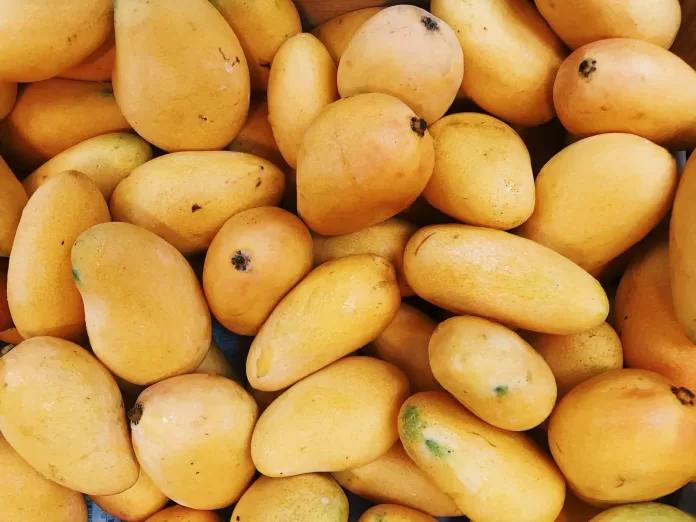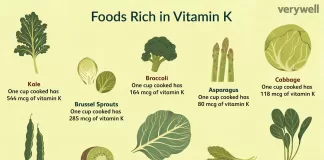Mangoes, frequently referred to as the “king of fruits,” have won the hearts of people all over the world with their delectable flavour and bright colours. These delightful tropical treats have a long, illustrious history that dates back to South Asia. Mangoes are a golden fruit of health and happiness because they are loaded with important nutrients in addition to their delicious flavour. We shall explore the mysteries of mangoes in this post, including their nutritional value, health advantages, different types, adaptability in the kitchen, and more. So take a bite of this luscious fruit and come along with us as we explore the health secrets of mangoes!
Table of contents
- Introduction
- Historical Background of Mangoes
- Nutritional Value of Mangoes
- Health Benefits of Mangoes
- 1-Boosted Immune System
- 2-Improved Digestive Health
- 3-Enhanced Eye Health
- 4-Healthy Skin
- 5-Heart-Healthy
- Mango Varieties and Their Characteristics
- 1-Alphonso
- 2-Tommy Atkins
- 3-Kent
- 4-Haden
- Mango: A Versatile Ingredient
- 1-Mangoes and Skin Health
- 2-Mangoes and Digestive Health
- 3-Mangoes and Eye Health
- 4-Mangoes and Immune System Support – a salient health secret of mango
- 5-Mangoes and Heart Health
- How to Select and Store Mangoes
- 1-Colour and Texture
- 2-Aroma
- 3-Weight
- 4-Ripening
- 5-Refrigeration
- Try These Mango Recipes
- 1-Mango Salsa
- 2-Mango Smoothie
- 3-Mango Sticky Rice
- 4-Mango Coconut Curry
- Mangoes: Tips for Growing Your Own
- 1-Climate
- 2-Variety Selection
- 3-Soil and Sun
- 4-Watering and Fertilizing
- 5-Pruning and Maintenance
- Conclusion
- FAQs
- 1. Are mangoes good for weight loss?
- 2. Can mangoes cause allergies?
- 3. Can mangoes be included in a diabetic diet?
- 4. How do I know if a mango is ripe?
- 5. Are mangoes genetically modified (GM)?
Introduction
Millions of people adore mangoes for their delectable flavour and exotic appeal. They originated on the Indian subcontinent and swiftly migrated to other continents, capturing the tastes of individuals from many cultural backgrounds. Mangoes are revered today as a representation of prosperity, joy, and indulgence throughout the summer. But this golden fruit is more complex than first appears. Let’s expose the rich mango tapestry by removing the outer layers.
Historical Background of Mangoes
From the Indian subcontinent to Southeast Asia, the Middle East, and elsewhere, the history of mangoes is entwined with that of ancient civilizations. Mango cultivation has been a significant component of many societies for more than 4,000 years; it is mentioned in ancient texts, poetry, and folklore. The beauty, flavour, and therapeutic qualities of this fruit have been lauded by emperors and kings, poets, and travellers alike. Mangoes became a symbol of cultural exchange as they travelled across continents, fusing customs and tastes to create a truly international fruit.
Nutritional Value of Mangoes
Mangoes are a powerhouse of important nutrients in addition to being a tasty delight. Mangoes are an abundant source of vitamins, minerals, and antioxidants and provide a complete package of goodness. Mangos include a large portion of your required daily intake of folate, vitamin A, and vitamin C in just one serving. Mangoes also include tiny levels of fibre, potassium, and other essential elements like vitamin E and B vitamins. Mangoes are a beneficial complement to a balanced diet because of their nutritional profile.
Health Benefits of Mangoes
In addition to their mouthwatering flavour, mangoes have a host of health advantages. Let’s look at some of the ways that this fruit from the tropics might improve your health:
1-Boosted Immune System
Vitamin C, found in abundance in mangoes, is essential for maintaining a strong immune system and warding against many diseases and infections.
2-Improved Digestive Health
Mangoes’ high fibre content promotes healthy digestion and helps people avoid constipation. Additionally, amylases and proteases, two enzymes found in mangoes, help break down proteins and carbs.
3-Enhanced Eye Health
Mangoes are a good source of important antioxidants including zeaxanthin and beta-carotene, which protect against age-related macular degeneration and improve vision.
4-Healthy Skin
Mangoes’ vitamin A and antioxidants support healthy skin, promote cell renewal, and lessen the effects of ageing. Mangoes are also a common ingredient in face washes and masks, among other natural skincare products.
5-Heart-Healthy
Mangoes’ fibre, potassium, and antioxidant content can support heart health and help keep blood pressure levels in a healthy range.
Mango Varieties and Their Characteristics
There are many different mango kinds, each with special qualities of its own. Here are a few common mango kinds you might find:
1-Alphonso
Alphonso mangoes, also referred to as the “King of Mangoes,” are prized for their intense flavour, silky texture, and alluring perfume. They are a prized variety and frequently regarded as the best tasting mangoes.
2-Tommy Atkins
This type is frequently found and distinguished by its vivid red and green skin. Tommy Atkins mangoes are suited for a variety of culinary uses because of their sweet and somewhat acidic flavour.
3-Kent
Mango fans appreciate Kent mangoes for their huge size and delicious flavour. They have a creamy texture and are frequently used to salads, desserts, and smoothies.
4-Haden
Haden mangoes are a traditional option because of their vivid red and green skin. They have a rich, sweet flavour that makes them perfect for eating raw or adding to chutneys and salsas.
These represent only a small portion of the huge mango cosmos. There is a mango to suit every palette because each variety has an own flavour, texture, and scent.
Mango: A Versatile Ingredient
Mangoes are popular not only as a solitary fruit but also as a flexible element in a wide variety of dishes. Their sour and tart flavour complements both savoury and sweet foods, providing a wide range of culinary options. Mangoes add a tropical touch to any recipe, enhancing everything from energising smoothies and salsas to decadent sweets and exotic curries. They make a tasty addition to fruit salads, ice creams, and drinks thanks to their brilliant colour and juicy texture. Mangoes add a splash of tropical sweetness to any recipe, whether they are grilled, pureed, or sliced.
1-Mangoes and Skin Health
Mangoes are not only delicious, but they also help to promote beautiful, healthy skin. Mangoes’ high vitamin A concentration encourages cell renewal and keeps skin looking young. Mangoes include antioxidants like vitamin C and beta-carotene that fight free radicals and shield the skin from harm brought on by the environment. Mangoes can also be applied externally to the skin to hydrate it. The skin can be moisturised and given a natural glow by applying a DIY face mask made of mashed mangoes. Mangoes let you satisfy your palate while improving the health and beauty of your skin.
2-Mangoes and Digestive Health
In addition to being a delicious treat, mangoes are also good for your digestive system. Mangoes’ high fibre content helps to keep the digestive system in good shape and prevents constipation. Fibre gives the stool bulk, which helps to promote easy bowel motions. Mangoes also include specific enzymes like amylases and proteases that help break down proteins and complex carbohydrates, respectively. By assisting with digestion, these enzymes make sure that your body can absorb nutrients efficiently. Therefore, the next time you enjoy a juicy mango, be aware that you are aiding your digestive system.
3-Mangoes and Eye Health
Mangoes can maintain the eyes clear and bright because it is said that they are the windows to the soul. Zeaxanthin, an antioxidant that is essential for preserving eye health, is abundant in mangoes. Zeaxanthin shields the eyes from ultraviolet ray damage and filters out harmful blue light. Additionally, the beta-carotene found in mangoes is transformed by the body into vitamin A, which is necessary for clear vision. Mangoes can help you maintain excellent eye health and guard against age-related macular degeneration.
4-Mangoes and Immune System Support – a salient health secret of mango
It is essential to have a robust immune system to sustain general health and wellbeing. Mangoes can help you by increasing your immune system. Vitamin C, a substance renowned for its ability to strengthen the immune system, is abundant in this fruit. White blood cells, the body’s line of defence against illnesses and infections, are produced more quickly as a result of vitamin C stimulation. You can give your immune system the assistance it needs to fight off diseases and stay strong by including mangoes in your diet.
5-Mangoes and Heart Health
Mangoes can help keep your heart healthy. Taking care of your heart is really important. Mangoes’ high potassium and fibre content benefits heart health. The risk of heart disease is decreased by fiber’s ability to lower LDL cholesterol levels, also referred to as “bad” cholesterol. On the other side, potassium supports cardiovascular health by helping to maintain healthy blood pressure levels. This means that savouring a sweet and juicy mango can be a great approach to look after your heart.
How to Select and Store Mangoes
Mangoes will taste their best if you choose and store them appropriately. Here are some recommendations to assist you in selecting ripe, tasty mangoes:
1-Colour and Texture
Look for mangoes with the distinctively brilliant colours for your variety. Mangoes with wrinkly skin, bruising, or soft areas should be avoided. When lightly squeezed, the skin should slightly yield.
2-Aroma
An aroma of sweetness and fragrance will come from the stem end of a ripe mango. Mangoes with a sour or no aroma should be avoided.
3-Weight
Choose mangoes that feel large for their size because this implies that they are juicy.
Once you’ve chosen the ideal mangoes, store them according to these recommendations:
4-Ripening
Mangoes should be stored in a paper bag at room temperature for a few days if they are not quite ripe. This will hasten the process of ripening.
5-Refrigeration
To store mangoes in the refrigerator, follow these steps:
- Choose ripe but firm mangoes.
- Place them in a breathable bag or wrap them individually in paper towels.
- Store in the crisper drawer of your refrigerator.
- Consume within 5-7 days for optimal freshness.
Try These Mango Recipes
Mangoes are a wonderful addition to many dishes, and their acidic, sweet flavour can turn any meal into a tropical treat. Here are some delectable mango recipes you should try:
1-Mango Salsa
For a zesty and reviving salsa, combine sliced mangoes, red onions, jalapenos, cilantro, lime juice, and a dash of salt. It goes nicely with tortilla chips, grilled chicken, or seafood.
2-Mango Smoothie
For a smooth and cool smoothie, combine ripe mangoes with yoghurt, a little orange juice, and a few ice cubes. You can personalise it by sprinkling on some honey or other fruits.
3-Mango Sticky Rice
Mango sticky rice is a well-known Thai dish that features sweet glutinous rice, luscious mango pieces, and a drizzle of coconut sauce. It’s a sweet delight from the tropics that will take you to paradise.
4-Mango Coconut Curry
Ripe mangoes, coconut milk, curry paste, vegetables, and your protein of choice come together to make a delectable curry. The combination of savoury and sweet flavours results in a delicious dish.
These are just a few suggestions to get you thinking, but there are countless ways you may use mangoes in your culinary endeavours.
Mangoes: Tips for Growing Your Own
Consider establishing your own mango tree if you enjoy gardening and want to experience the benefits of mangoes right from your backyard. To get you started, consider these suggestions:
Also Read
1-Climate
Mango trees flourish in warm, tropical and subtropical climates. Make sure the environment where you live is ideal for growing mangoes.
2-Variety Selection
Pick a mango variety that will fit your environment and flavour preferences. Take into account elements like fruit size, flavour, and ripening period.
3-Soil and Sun
Mango trees prefer a lot of sunlight and well-drained soil. Make sure the area where you wish to plant receives enough sunlight throughout the day.
4-Watering and Fertilizing
Mango trees need constant watering, particularly when they are flowering and bearing fruit. Use a balanced fertiliser to fertilise the tree to encourage fruit output and healthy growth.
5-Pruning and Maintenance
To keep your mango tree in shape and get rid of any diseased or dead branches, prune it frequently. Take the necessary precautions to safeguard your tree and keep a look out for insects and diseases.
Having your own mango tree allows you to enjoy the freshest mangoes available while also reaping the benefits of your labour.
Conclusion
Mangoes are definitely deserving of their reputation as the fruit of happiness and health. Mangoes have won over the hearts and palates of people all over the world thanks to its extensive nutritional worth, historical history, and cultural significance as well as their many culinary applications. Mangoes are a veritable gold mine of sweetness, whether you’re savouring the sweet, juicy flesh or taking advantage of their health advantages. In order to bring a bit of health and happiness into your life, embrace the lively world of mangoes.
FAQs
1. Are mangoes good for weight loss?
Mangoes have a fair amount of natural sugars, but they are also a rich source of fibre, which can help with satiety and weight control. Mangoes are delicious in moderation as part of a healthy diet.
2. Can mangoes cause allergies?
Mangos share a botanical family with poison oak and poison ivy, which can both make certain people ill with allergies. You may be susceptible to mangoes if you have a known sensitivity to these plants. If you think you might have an allergy, you should see an allergist.
3. Can mangoes be included in a diabetic diet?
Mangoes are naturally sweet and high in carbs, thus diabetics should limit their consumption. It’s crucial to keep an eye on blood sugar levels and identify the right portion sizes with the help of a healthcare practitioner.
4. How do I know if a mango is ripe?
A ripe mango has a delicious scent at the stem end and will slightly give to soft pressure. Mangoes that are too soft or smell sour should be avoided.
5. Are mangoes genetically modified (GM)?
There are no genetically altered mango cultivars that are sold commercially. Mangoes are often propagated by grafting methods or from seeds.





